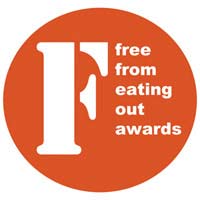There’s a very interesting thread on the messageboard today, about what our children are being taught in school about gluten and coeliac disease.

A mother has written a post saying (about her teenage son): “In his GCSE food tech lesson,his text book states flour is safe as gluten is only formed when it gets hydrated. His teacher is now telling him and the rest of his class he should be able to eat wheat flour crumbles, biscuits etc. And can work with wheat flour and breathe it in. i’ve spent years teaching him and this book and his teacher has put doubt in his mind”. (Note for those not in the UK: GCSEs are the exams young people take at 16).
This has – naturally – caused shock and consternation, and has led people to identify a whole range of misinformation being provided by schools, such as … one school’s revision guide which implies that just as if you don’t have enough iron, you get anaemic, if you don’t have enough gluten, you get coeliac disease. So very wrong! Another: an examination board appears to believe that adding fat to flour “coats flour grains to stop gluten forming when water is added, to make sure that the pastry has a short crumbly texture”
For the most part, this isn’t the fault of the school, as textbooks tend to be taken as truth – but as we all know, nothing and no-one is infallible. Unfortunately, once something is published, it tends to replicate across other publications.
The really shocking thing about this is that the teacher won’t believe that the text book can be wrong, won’t let the child take the book home so that the parent can check the information, and was scornful of the idea that the mother could correct the examination board.
The advice of the messageboard today was that the mother should contact: the school governors, Sarah Sleet (CEO of Coeliac UK), the examination boards and the publisher of the offending textbooks.
What would you do?
 |
I’ve written a book summarising what we’ve learnt over 20 years of dealing with the gluten free diet, and it might be just what you’re looking for. It packs the lessons we’ve learned into what I hope is a helpful and straightforward guidebook. It’s available on Amazon, as a paperback or for your Kindle… |




WOW.
This is a sadly shocking and frustrating story to read.
What’s worse: I’m sure there are many parents out there who don’t have enough information to combat this text/type of teacher – and that is heartbreaking too!
I would DEFINITELY encourage this parent to speak to anyone and everyone who will listen. She could enlist the help of local area food scientists or the local culinary schools to help INFORM this school and publishing company.
I find this misinformation to be very dangerous to the many who suffer without knowing and for those of us with “support” systems who lack the understanding about the damage done with grains of wheat or “just a taste” of their food.
OH. This is SO SAD!
I do hope you will keep us updated with this one if you can.
-Kate
Hi Kate – you’re right, it is very frustrating. Thing is, of course, we don’t know what other misinformation is being supplied, and just have to combat it one item at a time.
That poor mum, too – aged 14/15 just isn’t the right time to be told that your mother has got it wrong!
If I hear any more about this I’ll give you an update.
Well here is another example where the child’s health is at risk. I would certainly contact the school govenors. I would go armed with literature from my physician, the celiac association, a dietician/nutritionist etc.
I would request that this textbook be replaced with one that might not be dangerous to a childs health and also that the teacher be reprimanded for using the guildlines of a textbook to override a parents demands where the health of a child with a diagnosed illness is concerned. Especially where very commonly known treatments (avoid all wheat flour) are concerned.
Hopefully she will persue this with every option available to her. Her child is not the only one at risk here.
Laney
Laney – thanks for the suggestions (I’ll pass them on). I suspect the teacher has got himself into a difficult situation here …